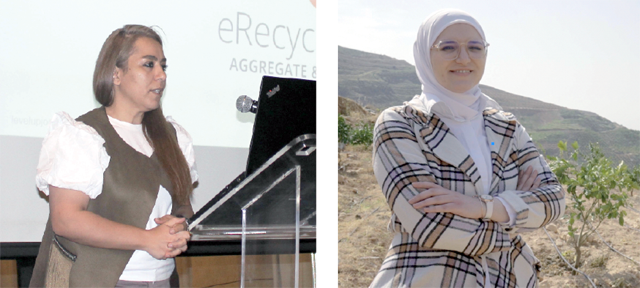AMMAN — While technology is rapidly advancing, potentially widening the existing digital gender gap, women and girls in Jordan choose to keep pace against all odds — they decide to power on.
The Global Gender Gap report (2018) shows that 75 per cent of jobs will be related to Science, Technology, Engineering, and Mathematics (STEM) areas by 2050. Yet, today, women hold just 22 per cent of positions in artificial intelligence (AI) globally, to name just one, according to a statement from UN Jordan.
In Jordan, UNESCO revealed that females represented more than 60 per cent of students in the natural sciences, medicine, dentistry and pharmacy in 2022. However, figures for female students in engineering and computer science were around 28 per cent and 45 per cent, respectively, during the same period.
While the situation in Jordan presents an encouraging picture, the need to increase women and girls’ representation across technology and innovation fields has become more pressing than ever, the statement said.
As International Women’s Day is celebrated under the theme: “DigitALL: Innovation and technology for gender equality”, UN Jordan shared the stories of four women in Jordan deploying technology to address various challenges.
Digital agribusiness
Salma Amayri, an electrical engineer, utilises her education and knowledge to develop innovative systems that help farmers reach the optimum use of water and fertilisers by delivering the precise amount of water and nutrients to plants in a timely manner.
As Jordan is one of the most water-scarce countries in the world, Amayri’s innovation contributes to addressing water scarcity in the agriculture sector.
Her project, “Smart Irrigation and Fertigation System”, saves up to 30 per cent of water consumption in open fields and up to 70 per cent in closed systems by providing remote control of farms’ irrigation using the Internet of Things at a competitive price.
As a co-founder of “Smart Green for AgriTech Solutions” startup, Amayri was among those who received training and capacity-building through UNDP’s SDG climate facility project “Scaling up Water Innovation for Climate Security in Northern Jordan”.
Through UNDP’s support, Salma presented her project at the MENA Climate Week in Dubai in March 2022.
UNDP’s SDG climate facility project aims at scaling up innovation in water management for climate security in Northern Jordan through the targeting of startups. It has been in operation since 2021 and will be implemented over a two-year period with the aim of strengthening water resource management in the Jerash and Mafraq governorates.
“It’s vital to inspire and empower the next generation of female role models to create a more diverse and inclusive tech world. We need more women at the forefront of tech and innovation,” said the 30-year-old entrepreneur.
AI to promote recycling culture
Enas Radwan’s interest in recycling prompted her, with other Jordanians, to develop eRecycleHUB, a social platform that provides users with a convenient, accessible and affordable tool to recycle more effectively.
As Jordan faces increasing pressure on its waste management infrastructure, Radwan and her partners’ project contributes to enhancing the average recycling rate while supporting low-income communities in earning profits from recycling.
Her interest in the recycling business goes back to 2018 when she realised that there was a need in Jordan to provide recycling services and to reach out to people to encourage them to preserve the environment while getting rewarded for their recyclables or donating them for a good cause.
In 2021, she teamed up with other partners and developed the eRecycleHUB platform. Users can sign up for the platform using the mobile or web application, book a collection time when eRecycleHUB’s collectors are in their area and receive points for providing various forms of recyclable waste for collection.
Through her start-up, Radwan offers waste-identification AI software that identifies the recycling availability of certain types of waste to increase the value of collected recyclables while also enhancing a community’s recycling behaviour.
Radwan received two grants from UNICEF to develop her business and participated in the LevelUP accelerator initiative in 2021, a programme by UNIDO that aims to support entrepreneurs, innovators, SMEs, start-ups and organisations to build successful business models to enter global markets.
The LevelUp initiative encourages a community of young women and men who are motivated to achieve an inclusive and sustainable digital transition and share their experiences of digital transformation. Radwan was recognised as one of the top entrepreneurs who completed the required phases of the programme and received the title of Champions of Digital Change.
‘’The LevelUp accelerator programme provided the dotted lines and interactive pathway for us to build our business from the ground up in a structured way,” said Radwan.
Technology to fix home appliances
For Rola and Nahid, technological literacy can be helpful in the home.
Both Rola and Nahid are currently enrolled in mobiles maintenance training funded by UNHCR and implemented by CARE in Azraq camp for Syrian refugees.
“I want to master this field,” said Rola, a 32-year-old mother of six.
She added that she wants to rely on herself to fix devices used by her family.
For Nahid, however, she wants to be a role model for her own children.
“We have a duty to grow the love of knowledge in our children, which is why I need to educate myself first.”
“I was afraid to enter the technology field, and I think many women and girls feel the same way. I’m now aiming at encouraging the women in the camp to join this activity, as is the future,” said the 30-year-old Azraq camp resident.
Now, there are 12 female and 18 male participants being trained by UNHCR in the camp.
UNHCR, in partnership with CARE, established the Technology Lab activities in Azraq camp at the community centres. The labs are equipped with devices and Internet access, which enables Azraq camp resident to participate in courses. The technology learning programmes include basic computer skills and coding, along with Internet browsing.
UN Jordan contributed this story to The Jordan Times with inputs from UNDP, UNIDO and UNHCR
